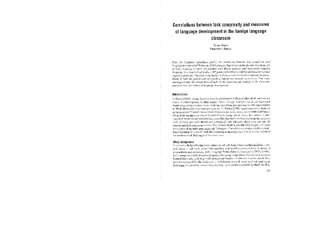| dc.contributor.author | Waara, Renee | |
| dc.date.accessioned | 2012-11-16T11:53:18Z | |
| dc.date.available | 2012-11-16T11:53:18Z | |
| dc.date.issued | 2011-05 | |
| dc.identifier.citation | Waara, R. Correlations between task complexity and measures og language development in the foreign language classroom. I T.L. Hoel [et al.](red.), FoU i praksis 2010 : rapport fra konferanse om praksisrettet FoU i lærerutdanning (s. 531-540). Trondheim: Tapir akademisk forlag. | no_NO |
| dc.identifier.isbn | 978-82-519-2730-7 | |
| dc.identifier.uri | http://hdl.handle.net/11250/145867 | |
| dc.description.abstract | Does the Cognition Hypothesis predict the correlation between task complexity and language development? Robinson (2003) proposes that by increasing the cognitive demands in tasks, language learners will produce more fluent, accurate and structurally complex language. In a longitudinal study, a 10th grade class follows a syllabus designed to increase cognitive demands. The class ranks higher in fluency and structural complexity measurements in both the spoken and written data, but do not improve in accuracy. This study investergates how complexities of tasks in the classroom are realized in the classroom and how they are realeted to language development. | no_NO |
| dc.language.iso | eng | no_NO |
| dc.publisher | Tapir akademisk forlag | no_NO |
| dc.subject | foreign language | no_NO |
| dc.subject | english | no_NO |
| dc.subject | didactics | no_NO |
| dc.subject | fremmedspråk | no_NO |
| dc.subject | didaktikk | no_NO |
| dc.title | Correlations between task complexity and measures og language development in the foreign language classroom | no_NO |
| dc.type | Chapter | no_NO |
| dc.type | Peer reviewed | no_NO |
| dc.subject.nsi | VDP::Social science: 200::Education: 280::Subject didactics: 283 | no_NO |
| dc.source.pagenumber | 531-540 | no_NO |
